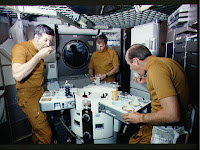All eyes will be on Apple this week as the company is set to unveil its latest gadget, which pretty much everyone expects will be a touchscreen tablet computer of some sort. For months now, the iSlate or iPad, or whatever it's going to be called, has been the subject of intense speculation by technology reporters and bloggers. Every last detail, from its technical specifications to price tag, has been guessed at. It's gotten to the point of ridiculousness, where even normally quality media have joined in on the guessing game.
PC World, for example, ran
an article over the weekend with the headline "Apple Tablet an Ideal Business Tool." That's a pretty bold statement to make about a product that
doesn't exist yet.

Much of the hype arises from Apple's track record. The company did, after all, revolutionize music with the iPod and wireless internet with the iPhone. It also stems from the company's utter secrecy when it comes to new products; by remaining absolutely quiet about them until they launch, Apple has created an entire ecosystem of hype that is fed by everyone from financial analysts to bloggers. As a result, the company barely has to promote its own products since these people do it for them.
Nevertheless, one of the other reasons why the Apple tablet is creating such a buzz is that some people
are hoping it can do for publishing what the iPod did for music - that is, reinvent the market and haul it into the digital age.
The movement is already well underway. Amazon.com has so far been the leader in the so-called e-reader market with the Kindle, a nifty device that simulates the look and feel of a book with its "e-ink" technology. Amazon touted the Kindle as its
hottest-selling item during the Christmas holidays, while the forecasts continue to pour in on how electronic book sales are supposed to skyrocket. E-readers were understandably all the rage at this year's Consumer Electronics Show in Las Vegas, with a number of companies promising their own models. Apple, of course, could clobber them all with its announcement on Wednesday.
But are e-books ready for prime time? It's something I've been thinking about for some time now, from the perspective of both a writer and a reader, and I must admit to mixed feelings about the issue.
For authors, e-books present an incredible opportunity, and there is indeed major change coming in how books are published. Under the old system, a prospective author would pitch his or her book to editors at various publishing houses in the hopes that someone would go for it. If the author was lucky, he or she would score a deal and the publisher would sell printed copies of the book through bookstores or online through Amazon, Chapters and the like. The author would earn an upfront advance and then a small percentage - usually something like 10 or 15 per cent - from the sale of each copy. The publisher and the seller would split the remaining 85 to 90 per cent. Overall, while the author could still earn a handsome amount if the book sold well, he or she got comparatively little of the overall pie.
The new system that is emerging is giving authors considerably more power - and more potential reward. Now, pretty much anyone who can string two words together can sell an e-book through Amazon, for delivery to the company's Kindle e-reader. If you've got that great unpublished novel sitting around on your hard drive, now's your chance - Amazon's can deliver your book to a growing audience of Kindle-equipped readers.
And it's getting better. Just last week, in preparation for Apple's tablet, Amazon revised the terms of how people can do this and
boosted the earnings they can get up to 70 per cent of the retail price, which the author gets to set. Not only does this system empower every would-be author out there - and there must be thousands if not millions of unpublished books in just the English-speaking world - it also gives them the potential to earn some serious money. I've done the math; if I self-published my e-book on Amazon for just $5, I would earn more money per copy than under my current publishing deals.
But who will buy these e-books? After all, the New York Times reports that many of the Kindle's best-sellers are those books that are
given away for free. Well, that's true - nothing sells quite like free. But this is again where the system is changing. Under the old regime, book publishers used their hefty portion of the cover price to promote the book. They had contacts with people in the old media - television, radio, newspapers - who they could rely on for promotion. They could also send authors on tour to do book signings, readings, lectures and so forth. All of this would translate into awareness of the book, and therefore hopefully into sales.
The new system puts the onus of promotion squarely on the author, which opens up a world of possibilities. A couple of buzzwords (which I am growing increasingly loathsome of) come into play here: social media and crowdsourcing. You don't have to be a marketing wizard to spread the word about your self-published e-book using social media tools such as a blog (like this one), and . Aside from interacting with people on those sites and spreading the word personally, if you're willing to spend a few bucks, Google and Facebook have made it ridiculously easy to run ads on their respective services (I'm running ads for
Sex, Bombs and Burgers on both right now).
Word of mouth - or word of email/text - is also quite powerful online. There have been countless examples of things that have gone viral on the internet and there is always the possibility that it can happen to your book. One good example that comes to mind is Chicago band
OK Go. They'd been around for a while but only hit it big in 2006 after uploading a video to YouTube for
Here It Goes Again, which featured the band in an elaborate dance routine on treadmills. The video became a huge hit on the site and the band's popularity exploded. The same is going to be possible for books, especially after websites devoted exclusively to self-published books (YouRead?) inevitably take off.
So where does this leave old-guard publishers? Well, if you add up all of the above, it doesn't sound good for them. If the internet, Amazon and e-readers all conspire to cut them out of the equation, the future doesn't look too bright for publishers, does it? Perhaps - but that's where the reader experience comes into play.
I've had a chance to play around with both Amazon's Kindle and Sony's Reader, and I've read full books on both. To be honest, it's not an experience I'm fully sold on yet. The e-ink displays are nice, but they still give off glare in brightly lit areas. And, at the risk of sounding like a grumpy old man, plain old books never run out of batteries (both readers died on me at key times). I'm also somewhat old school in that I like collecting shelves of books; when I glance at them, they take me back to a certain time and place. Digital books, for all their portability and convenience, offer no such nostalgia.
Mind you, the same could be said about CDs. I used to like looking at them on my racks - each album reminded me of a certain feeling or experience. But now, they're just a pain to move and keep free from dust. I get just about all of my music digitally now, with CD purchases reserved only for those very special bands whose packaging I must have (cough cough).
I'm not sure about how the mass market will react to e-books, but I think I'm going to treat them the same way I do music. For the really good stuff, I'm still going to buy the physical printed version. For the time-wasting, beach-reading fluff (cough
Dan Brown cough), I'll buy the cheaper e-book. That way, if the book sucks, I won't have to be reminded of the time I wasted reading it whenever I look at my shelf.
I suspect there's a lot of old-school readers out there who will want to stick with printed books for the same reasons. Just like the internet hasn't (yet) killed off newspapers and magazines, I suspect there'll still be room for the printed page for years to come. The other problem is that with the flood of self-published e-books that will surely come, it's going to become much more difficult to get your particular book noticed, which is where the old guard's promotional system still holds some appeal.
One thing is for sure, though: book publishers are going to have to adjust to the new reality and are going to have to do more for authors - especially the established ones - to keep them from going the potentially more-lucrative self-publishing route.
UPDATE: Damian Kulash of OK Go recently posted an open letter about how YouTube and his record label, EMI, were not allowing the band to put videos up on the site that can be embedded. The problem is that YouTube's software doesn't allow ads to play over the video when it is embedded on non-YouTube sites. This is super-ironic given how the band rose to prominence.
 As Fleshbot puts it, the iPad - which Apple is trying to position as a device in between a laptop and a smartphone - is actually "the worst of both worlds." Not only is Apple absolutely dictating what you can put on it by forcing you to buy content from iTunes, where porn is not allowed, it also doesn't have a DVD drive so you can't watch your smut that way. Worse still, as I mentioned yesterday, the iPad doesn't handle Flash, which is the format most web video, including lots of porn, is done in.
As Fleshbot puts it, the iPad - which Apple is trying to position as a device in between a laptop and a smartphone - is actually "the worst of both worlds." Not only is Apple absolutely dictating what you can put on it by forcing you to buy content from iTunes, where porn is not allowed, it also doesn't have a DVD drive so you can't watch your smut that way. Worse still, as I mentioned yesterday, the iPad doesn't handle Flash, which is the format most web video, including lots of porn, is done in.















